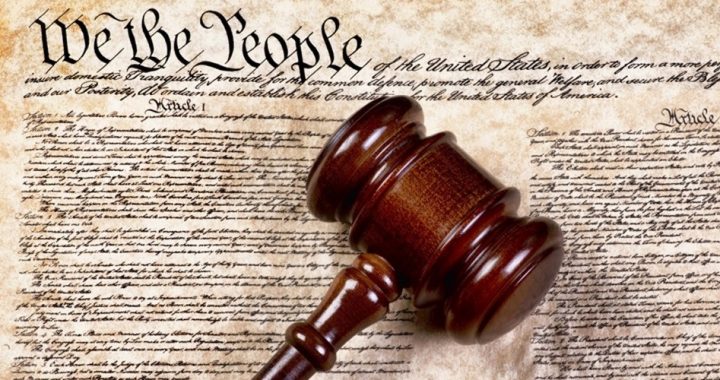
On August 7, Judge Justin Quackenbush of the U.S. District Court in Spokane ordered a lawsuit against two psychologists who helped design the CIA’s post-9/11 “enhanced interrogation” program to go to a jury trial in September. The lawsuit, Salim v. Mitchell, was filed by the ACLU in 2015 on behalf of three former detainees, one of whom died in CIA custody.
The defendants, psychologists James Mitchell and John “Bruce” Jessen, were recruited by the CIA in 2002 to design and help conduct “enhanced interrogation techniques” to be used on war-on-terror suspects captured in Afghanistan and elsewhere. Critics of the techniques (including former CIA Director Leon Panetta) have maintained that “enhanced interrogation” is nothing more than a euphemism for the systematic torture of detainees by the CIA, the Defense Intelligence Agency (DIA), and various components of the U.S. Armed Forces at black sites around the world. The so-called enhanced interrogration techniques have included the use of waterboarding.
The complaint charges that Suleiman Abdullah Salim, Mohamed Ahmed Ben Soud, and Gul Rahman (who died at Detention Site Cobalt — the CIA’s black site outside Bagram Air Base, Afghanistan in 2002) were subjected to an “experimental torture program” that was “designed, implemented, and personally administered” by the two defendants, Mitchell and Jessen.
A summary of the case posted at the Lawfare blog notes the plaintiffs’ argument that the psychologists’ actions constituted torture, non-consensual human experimentation, and war crimes. The plaintiffs seek compensatory and punitive damages.
The lawsuit will be the first involving the torture program to go to trial. While some conservatives may be skeptical of any lawsuit taken by the ACLU, which has a long history of filing cases against things such as prayer in schools and the public display of religious symbols in public places, the generally leftist organization will occasionally take up a human rights case that libertarians and constitutionalists can support in good conscience. Salim v. Mitchell is one such case.
ACLU attorney Dror Ladin said in a statement after Quackenbush’s ruling: “The court’s ruling means that for the first time, individuals responsible for the brutal and unlawful CIA torture program will face meaningful legal accountability for what they did. Our clients have waited a long time for justice.”
An article posted by Shawdowproof noted that defense lawyers for Mitchell and Jessen employed a curious argument in their failed attempt to persuade Quackenbush to dismiss the lawsuit. They invoked the cases of Karl Rasche, a banker who “facilitated large loans to a fund at the personal disposal of Heinrich Himmler,” the head of the S.S., and Joachim Drosihn, who was a gassing technician for the firm that manufactured the poison gas Zyklon B, used to exterminate Jewish people in concentration camps. The defense noted that in the case involving Zyklon B, the “owner and second-in-command of the firm were found guilty; Drosihn, the firm’s first gassing technician, was acquitted.”
The defense attempted to cast Mitchell and Jessen in the same role as Drosihn, who was acquitted.
“Here, it is undisputed that, as independent contractors serving on a larger interrogation team, Defendants lacked authority to “control, prevent, or modify” the CIA’s decision to use [enhanced interrogation techniques] on detainees,” the defense argued.
However, Quackenbush would not buy that argument.
In reviewing the facts of the case, Quackenbush noted that far from being innocent advisors, Mitchell and Jessen were involved in “actual interrogations of certain individuals, including Rahman, which occurred in foreign, secret, locations.”
“The finder of fact could conclude that although the CIA may have maintained ultimate control of the program, defendants, being on site, exercised significant control during individual interrogations,” Quackenbush suggested. “For example, excerpts from Mitchell’s book describe that he decided to deviate from the legal guidance on the length of pours during waterboarding. He states ‘legal guidance said we could pour water between 20 to 40 seconds and then lower the cloth and pour water another 20 to 40 seconds, and so on, for 20 minutes.’”
Defenders of the use of waterboarding and other forms of torture have attempted to justify these actions on the grounds that the interrogations have revealed critical information essential to our national defense and have therefore, saved many lives. However, such arguments ignore many critical points, the most fundamental of which is the centuries-old principle found in our legal system called presumption of innocence. Several sections of the Bill of Rights (particularly the Fifth and Sixth Amendments) exist to protect this concept. In order to circumvent the mandated rights of the accused parties demanded by these amendments, the suspected terrorists were held at black sites such as Guantanamo Bay and Bagram, which are outside the jurisdiction of our laws.
“But they are terrorists,” some have argued. “They have no rights. They mean us harm.” There is a difference between a proven terrorist and a suspected terrorist, however. Terrorism may be a more heinous crime than most others, but someone accused of a crime still has the right to be presumed innocent until proven guilty. Absent the legal process demanded by the Bill of Rights, any one of us could be charged with terrorism and spirited away to Guantanamo Bay for “enhanced interrogation.”
If a suspect is truly a terrorist who means us harm, that should easily be provable using the traditional legal process guaranteed by our Constitution.
Judge Quackenbush is 88 years old and graduated from law school 60 years ago. His long tenure in our legal system has undoubtedly taught him respect for that system and an appreciation of how the law serves to protect the rights of everyone accused of a crime. The rest will be in the hands of the jury that hears this case when it goes to trial next month.
Photo: Thinkstock
Related articles:
Trump Justifies Torture, Saying “It Works”
Study Shows Guantanamo Intelligence Gathering Is “Ineffective”
The Tortured Logic of the Torture Lobby
Are Dick Cheney and Michael Hayden Afraid of Torture Prosecution?



